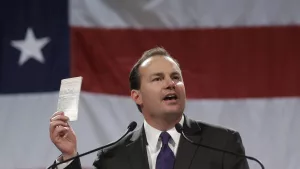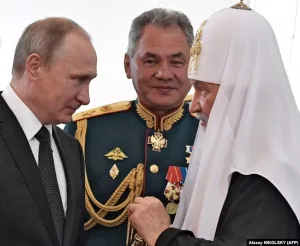Op-Ed denotes an article that is opposite to editorial. Thus, this article does not reflect the official views of The Stork, nor the personal views of The Stork’s Editorial Team.
Suppose you have read the famously renowned book “Sapiens” by Yuval Noah Harari. In that case, you might remember that despite how strongly we wish to be different from animals because of our ability to appreciate art or due to our intelligence, what separates us from the rest of living beings is the ability to create myths and live in a fake world. In the last few decades, we have achieved just that – a false image of the world – a world order gently guided by diplomacy and international peace treaties driven by globalization, innovation, and shared values. We are told that this is the most prolonged time that humanity has lived in peace. And we could not be more in denial. Politicians, unaware, are losing power by the day, and we, civilians, are losing our power of protest by the minute, while the amount of military activity, terrorist attacks, and conflicts are rising by the second.
The world order is in a state of transition, a transition unlike anything history has seen before. Never before have international politics included so many participants with different historical and cultural backgrounds as today. Still, it is not about a simply new distribution of power within a limited number of imperial states like centuries ago; instead, it is the construction of a new hierarchy in an era where politicians have created a false world through AI algorithms and the isolating and polarizing power of the internet. To understand why today’s world of diplomacy is so dangerously fraudulent, it is necessary to go back in time and remember the world after 9/11.
Everyone was possessed by the dangers that could be hidden in the future and how to avoid them at all costs. Instead of facing the complexity of Israeli and Palestinian politics and recognizing terrorism as violence born out of the political struggle for power, the US and the rest of the West replaced it with an image of an evil tyrant – a ruthless criminal – who wanted to terrorize the world. Thus, only the extermination of such evil could bring peace to everyone in the “civilized” world, and it was America’s job, the defender of world peace, to eradicate the weapons of mass destruction and search for vengeance for all innocent lives lost. Iraq’s president, Saddam Hussein, became the new target. It only took three sentences to justify the invasion of Iraq to the still traumatized people of America after the attacks of 9/11, “The regime has a history of reckless aggression in the Middle East. It has a deep hatred of America and our friends. And it has aided, trained, and harbored terrorists, including operatives of al Qaeda.”. All three were based on a distorted perception of the world propagandized by the United States and Great Britain.
In breaking Iraq, massacring at least 300,000 citizens, and displacing thousands, the country has fallen into chaos and left a power void, which provoked the emergence of severely violent terrorist groups such as ISIS. Not only were the weapons of mass destruction nowhere to be found, but it was apparent now that Iraq had no affiliations with al-Qaeda and that the United States had managed to become the best weapon for its own destruction. In numbers, the Iraq war cost at least $2 trillion, according to the Brown University project. However, aside from this, America had lost its credibility and set a precedent for all other nations to do the same. The US demonstrated with its example that falsifying evidence, creating false reasons to justify the invasion, and resorting to torture are all possible without facing any political consequence, and many admired this, including Russia. Since then, many more politicians have followed the example, some of the most famous being Trump and his admirer – Putin. And if you ask me, everything this has accomplished is to weaken politics and disarm politicians, subjecting them to the false world they create that is destined to rebel and expose its true, horrid face. As it currently is showing on the Palestinian territories occupied by Israel. World politics unsurprisingly made it seem a debatable issue, but I only have one question for you to consider, how much more must the families of Gaza suffer, and who is capable of letting them live with dignity, safety, and freedom?
Diplomacy? Diplomacy as we know it had perished along with most of our creative thought by the beginning of the 21st century.
Since the politicians realized they could play with reality at their own expense for the sake of a seemingly stabilized world, a fake society was created where everyone knows what our leaders say is untrue. However, we all play along because no one can imagine any alternative. We are all a part of the system, just as deeply drowning in it as our painfully charming representatives.
A great example of such a politician is Donald Trump, a greedy businessman turned into the populist leader of the white straight male working class. His campaign was unlike anything seen before but imitated the nature of Western politics since the beginning of the 21st century: no belief was fixed, and everything was constantly changing. Trump’s campaign signaled the defeat of journalism, the defeat of the people. No matter how many lies Trump spread, it was irrelevant to the masses. Not to say there was no outrage, but the anger was only ever expressed on the internet and had no effect, because of the nature of our algorithms – they are designed to reflect our beliefs to us. Once we realize that the internet has no power to change the world, only then can we ever have any attempt at producing a successful revolution against the established system.
It is 2011, and Facebook’s platform has helped gather thousands and organize the first protests as a start of the Arab Spring, which showed how the internet could help manage revolutions without needing a charismatic leader. Many thought that this would be the end of authoritarianism and that this meant democratic change. The protests had spread from Tunisia to Egypt, Yemen, Libya, Bahrain and Syria. Some brought down a government, drove an aged dictator into exile, or murdered the tyrant, as happened in Libya.

Nevertheless, the most successful cases, like Tunisia, have not achieved sufficient improvements towards democracy or equality. In contrast, the least successful, such as Yemen, where at first President Saleh did step down, yet the vacant power void allowed for harsh counter-revolutionary forces to come in and sparked a still ongoing civil war. Tunisia was the only country to have transitioned to another form of governance, yet the nation has yet to succeed. The current regime is struggling to root out corruption, and with each year, a growing number of Tunisians affirm that they believe their country is heading in the wrong direction. This example shows that the Arab Spring failed and serves as testimony to the world that despite how freeing and empowering the internet may seem, it has only weakened us as societies.
After the countless failed modern revolutions, what else is left for the people to do than detach themselves from the outside world to try and change minds online through self-expression? The idea of an external revolution is deferred indefinitely while we keep losing touch with the violent reality of power.
Since 1946, the number of war deaths has been declining, yet the number of conflicts is on the rise. Unlike the previous century, nowadays, most violence arises between non-state actors, such as terrorist groups, over unresolved regional tensions, illicit economic gain, and power voids. “In 2016, more countries experienced violent conflict than at any point in almost 30 years.” says the UN. In the last 15 years, more than half of the world’s population has lived in direct contact with political violence. And nevertheless, we are told that the 21st century is the era of peace. Believe me when I tell you that World War 3 has started, and we have been at it for a long time. The battlefield has been moved to the East, and countries have exchanged avatars and usernames. Since AI has been introduced into this game, the attacks have been more challenging to attribute and more accessible to make, allowing smaller groups to carry them out, and we are the NPCs stuck to meddle in the realm of false freedom and normalization of surveillance.
There is no way to predict where this charade of the avant-garde theater will lead us. All I know is that it won’t be a good place. If we stop believing in the power of reason and politics and let the dark uncertainty of the future consume us, we will most definitely be forced to live out the stories of humanity’s best dystopian writers. We are in grave need of a world leader who will give us a reason to believe that a new system is indeed possible and that revolution is feasible when united not behind a screen but behind a powerful idea.
Featured photo: AFP






